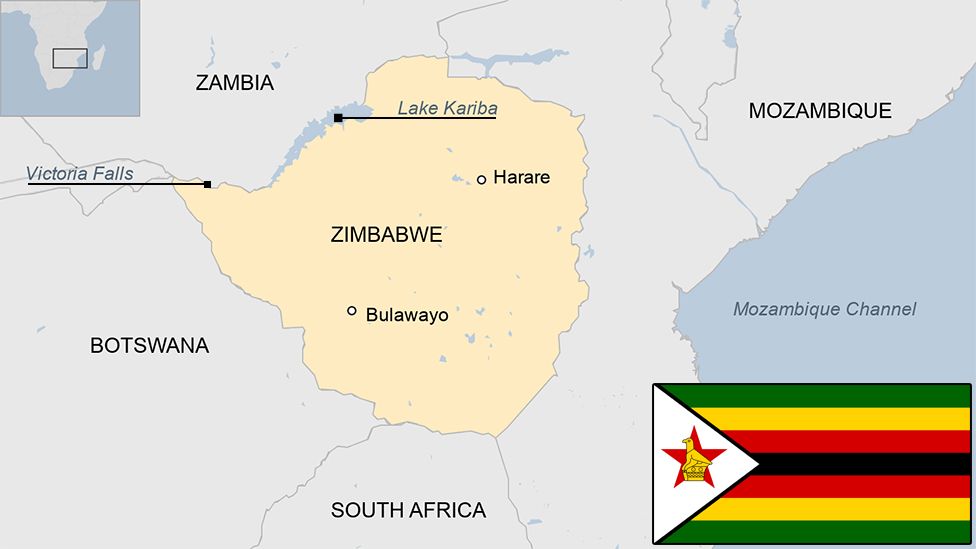Zimbabwe country profile
- Published

The struggle for independence, land and power runs throughout Zimbabwe's modern history. Veteran President Robert Mugabe dominated the country's political scene for almost four decades after independence from Britain in 1980.
Once the bread basket of the region, since 2000 Zimbabwe has struggled to feed its own people due to severe droughts and the effects of a land reform programme that saw white-owned farms redistributed to landless Zimbabweans, with sharp falls in production.
The fall of Robert Mugabe in 2017 freed up politics and the media, but the country remains cash-strapped and impoverished.
- Read more country profiles - Profiles by BBC Monitoring
REPUBLIC OF ZIMBABWE: FACTS
- Capital: Harare
- Area: 390757 sq km
- Population: 15.17 million
- Languages: Chibarwe, English, Kalanga, Koisan, Nambya, Ndau, Ndebele, Shangani, Shona, Sotho, Tonga, Tswana, Venda, Xhosa, Chewa
- Life expectancy: 59 years (men) 62 years (women)
LEADER
President: Emmerson Mnangagwa
Emmerson Mnangagwa became president in November 2017 following a dramatic week in which the military took charge and Robert Mugabe resigned after 37 years in office.
He was re-elected as president in 2018. Mr Mnangagwa was again re-elected in August 2023 in a poll that observers said did not meet local laws and global standards, gaining 52.6% of the valid votes cast while his opponent Nelson Chamisa came second with 44%. Mr Chamisa rejected the results.
When he first became president, Mr Mnangagwa - known as "The Crocodile" for his ruthlessness - promised a new start for his country's people.
But Zimbabwe is still struggling with high inflation and unemployment also remains rife. Mr Mnangagwa's vow to guarantee human rights also appears hollow, with little changing in this regard since Mr Mugabe's departure.
MEDIA
All broadcasters in Zimbabwe, and many of the main newspapers, toe the government line.
Radio is the main source of information. The state-run Zimbabwe Broadcasting Corporation (ZBC) operates TV and radio networks and two national private radio stations are licensed.
TIMELINE
Some key events in Zimbabwe's history:
1200-1600s - Rise and decline of the Monomotapa domain, thought to have been associated with Great Zimbabwe and to have been involved in gold mining and international trade.
1830s - Ndebele people fleeing Zulu violence and Boer migration in present-day South Africa move north and settle in what becomes known as Matabeleland.
1830-1890s - European hunters, traders and missionaries explore the region from the south. They include Cecil John Rhodes.
1889 - Rhodes' British South Africa Company obtains a British mandate to colonise what becomes Southern Rhodesia.
1893 - Ndebele uprising against British South Africa Company rule is crushed.
1922 - British South Africa Company administration ends, the white minority opts for self-government.
1930 - Land Apportionment Act restricts black access to land, forcing many into wage labour.
1930-1960s - Black opposition to colonial rule grows. Emergence in the 1960s of nationalist groups - the Zimbabwe African People's Union (Zapu) and the Zimbabwe African National Union (Zanu).
1953 - Britain creates the Central African Federation, made up of Southern Rhodesia (Zimbabwe), Northern Rhodesia (Zambia) and Nyasaland (Malawi).
1963 - Federation breaks up when Zambia and Malawi gain independence.
1965 - Prime Minister Ian Smith unilaterally declares independence from Britain under white-minority rule, leading to international isolation.
1972 - Guerrilla war against white rule intensifies, with rivals Zanu and Zapu operating out of Zambia and Mozambique.
1978 - Smith yields to pressure for negotiated settlement. Zanu and Zapu boycott transitional legislature elections. New state of Zimbabwe Rhodesia, led by Bishop Abel Muzorewa, fails to gain international recognition.
1979 - British-brokered all-party talks lead to a peace agreement and new constitution guaranteeing minority rights.
1980 - Zanu leader Robert Mugabe wins independence elections. Zimbabwe wins international recognition in April.
1982 - Prime Minister Mugabe sacks Zapu leader Joshua Nkomo from the cabinet, accusing him of plotting to overthrow the government.
1983-87 - Gukurahundi campaign, in which 20,000 are thought to have been killed in Matabeleland by Mugabe's Fifth Brigade. The violence ends following a unity accord, when the Zapu party is absorbed into the renamed governing Zanu-PF party.
1998-2002 - Zimbabwe intervenes in civil war in DR Congo.
1999 - Economic crisis worsened by Zimbabwe's unpopular military involvement in DR Congo civil war.
Opposition Movement for Democratic Change (MDC) formed.
2000s - Land redistribution: White farmers forced off land.
2002 - State of disaster declared as worsening food shortages threaten famine.
2006 - Annual inflation exceeds 1,000%
2008 - Opposition leader Morgan Tsvangirai beats Mugabe in the presidential election but is forced to withdraw from a run-off after his supporters become the target of increased violence.
2009 - Mugabe's Zanu-PF loses parliamentary majority forcing power-sharing deal with Tsvangirai's MDC which lasts until 2013.
2013 - Mr Mugabe gains a seventh term in office.
2017 - Mugabe resigns after 37 years in power. He is succeeded by Emmerson Mnangagwa.
2018 - Long term opposition leader Morgan Tsvangirai dies.
2022 - Increasing power shortages as a result of decades of under-investment.
Related Topics
- Published3 July 2023
- Published13 February
- Published21 February 2023
- Published24 March 2023
- Published1 May 2023
- Published24 July 2023